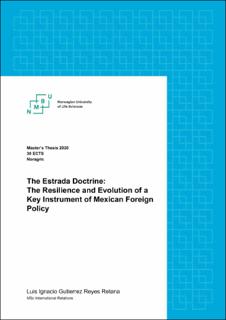| dc.contributor.advisor | McNeish, John Andrew | |
| dc.contributor.author | Gutierrez Reyes Retana, Luis Ignacio | |
| dc.coverage.spatial | Mexico | en_US |
| dc.date.accessioned | 2021-01-02T17:09:56Z | |
| dc.date.available | 2021-01-02T17:09:56Z | |
| dc.date.issued | 2020 | |
| dc.identifier.uri | https://hdl.handle.net/11250/2721186 | |
| dc.description.abstract | The Estrada Doctrine has guided Mexican foreign policy for ninety years. As we know, the international system and domestic and normative factors are not static, and in order to stay viable, the doctrine has had to evolve by adapting to different demands and by mutating its axiomatic principles in order to provide a framework that still generates practical rules for the conduct of foreign policy.
To establish how the Estrada Doctrine has mutated, the approach used in this thesis was drawn from a foreign policy perspective with Mexico as the focus. This is presented, under the premise that FP doctrines materialize when foreign policy changes. | en_US |
| dc.language.iso | eng | en_US |
| dc.publisher | Norwegian University of Life Sciences, Ås | en_US |
| dc.rights | Attribution-NonCommercial-NoDerivatives 4.0 Internasjonal | * |
| dc.rights.uri | http://creativecommons.org/licenses/by-nc-nd/4.0/deed.no | * |
| dc.title | The Estrada Doctrine : the resilience and evolution of a key instrument of Mexican foreign policy | en_US |
| dc.type | Master thesis | en_US |
| dc.subject.nsi | VDP::Social science: 200 | en_US |
| dc.description.localcode | M-IR | en_US |

